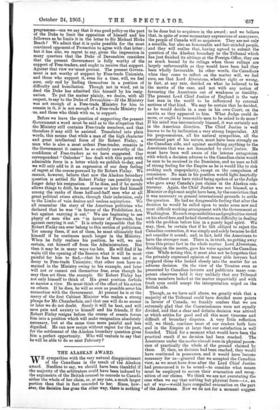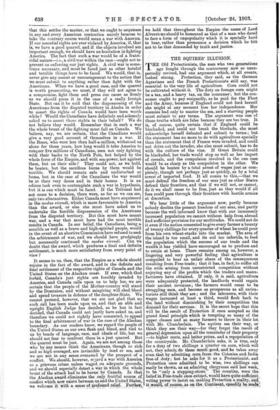THE ALASKAN AWARD.
WE sympathise with the very natural disappointment of the Canadians in the result of the Alaskan award. Needless to say, we should have been thankful if .the majority of the arbitrators could have been induced by the arguments of the British counsel to concede to Canada -either the whole of her claim, or, at any rate, a much larger portion than that in fact conceded to her. Since, how- dyer, the decision has gone the other way, there is nothing to be done but to acquiesce in the award ; and we believe that, in spite of some momentary expressions of annoyance, the people of Canada will so acquiesce. They are not only a sensible, but also an honourable and fair-minded people, and they will realise that, having agreed to submit the question of the Alaskan boundary to the Tribunal which has just fitished its sittings at the Foreign. Office, they are as much bound by its rulings when those rulings are largely unfavourable as they would have been had they been wholly favourable. In other words, the Canadians when they come to reflect on the matter will, we feel sure, see that Lord Alverstone, whether right or wrong, in fact, at any rate, decided on what he believed to be the merits of the case, and not with any notion of favouring the Americans out of weakness or timidity. The present Lord Chief Justice of England is the very last man in the world to be influenced by external motives of that kind. We may be certain that he decided, as he would decide in a case in his own Court, on the merits as they appeared to him. What Judge could do more, or ought by reasonable men to be asked to do more? If his mind was unconsciously biassed, it was certainly not in the American direction. The Chief Justice is well known to be by inclination a very strong Imperialist. All his prepossessions, all his natural sympathies, all the emotional part of his nature, must have been strongly on the Canadian side, and against sacrificing anything to the Americans that was not demanded by strict jUstice. He must have been well aware of the intense antagonism with which a decision adverse to the Canadian claim 'would be sure to be received in the Dominion, and no man so full of strong feeling for the Empire as he is would like to risk evoking such unpopularity, except on the compulsion of conscience. No man in his position would light-heartedly and without cause have risked being spoken of as the judge who gave away Canada's just claims in the Alaskan con- troversy. Again, the Chief Justice was not biassed, as a Minister or diplomat might have been, by the conviction that it was necessary on general international grounds to settle the question. He had no disagreeable feeling that after the decision he would be called upon to make some new and -most difficult working arrangement with the Government at Washington. No such responsibilities and perplexities rested on his shoulders, and he had therefore no difficulty in dealing with the problem before him in a purely legal spirit. We may, then, be certain that if he felt obliged to reject the Canadian contention, it was simply and solely because he did not consider it sound ; and, in fact, held the Americans to have the stronger case. There is, in truth, no getting away from this prime fact in the whole matter. Lord Alverstone, deciding on the merits, gave his voice against the Canadian case. While noting this, it must also not be forgotten that the privately expressed opinion of many able lawyers had prepared those who looked closely into the matter for an adverse decision. On the view of the Treaties even as presented by Canadian lawyers and publicists many com- petent observers held it very unlikely that any Tribunal whose members looked at the matter impartially and with fresh eyes could accept the interpretation urged on the British side.
Though, as we have said above, we greatly wish that a majority of the Tribunal could have decided more points in favour of Canada, we frankly confess that we are extremely glad that the Commissioners were not equally divided, and that a clear and definite decision was arrived at which settles for good and all this most tiresome and difficult of boundary disputes. A very tittle reflection will, we think, convince most of our • readers both here and in the Empire at large that our satisfaction is well founded. Think for a moment what would have been the practical result if no decision had been reached. The Americans under the modus vivendi were in physical posses- sion of practically the whole of the ground claimed by them. If, then, no decision had been reached, they would have continued in possession, and it would have becothe necessary for us—granted that we accepted the Canadian view, as we must have done after the Lord Chief Justice had pronounced it to be sound—to consider what means must be employed to secure their evacuation and recog- nition of our claims. We think we are not overstating the case when we say that nothing but physical force—i.e., an act of war—would have compelled evacuation on the part of the Americans. Now we do not for a moment suggest that this settles the matter, or that we ought to aequiesoe in any and every American contention merely because to take the contrary course would mean a war, with America.' If our essential rights are ever violated by America, if, that is, we have a good quarrel, and if the objects involved are important enough, we should have no hesitation in fighting America. The fact that such a war would be of a fratri- cidal nature—i.e., a civil war within the race—ought not to prevent us enforcing our just rights. A civil war is some- times necessary, and must be faced just as other hateful and terrible things have to be faced. We would, that is, never give any assent or encouragement to the notion that we must submit to anything rather than fight with the Americans. When we have a good case, and the quarrel is worth prosecuting, we must, if they will not agree to a compromise, fight them and press our cause as firmly as we should press it in the case of a really foreign State. But can it be said that the dispossessing of the Americans from the disputed territory in Alaska in order to assert the rights of Canada would have been worth while? Would the Canadians have definitely and solemnly asked us to assert those rights in their behalf ? We do not believe they would. Remember that in such a war the whole brunt of the fighting must fall on Canada. We believe, nay, we are certain, that the Canadians would give a very good account of themselves in a war. If the Boers, who were less than half-a-million, withstood us alone for three years, how long would it take America to conquer five millions of Canadians, men not only fighting with their backs' to the North Pole, but helped by the whole force of the Empire, and with sea-power, not against them, but on their side ? They could not, as we hold, be beaten, but the sacrifices borne by them would be terrible. We should ' remain safe and undisturbed at home, but in the case of the Canadians the war would be at their very, doors and in their homes. It is an odious task even to contemplate such a war in hypothesis, but it is one which must be faced. If the Tribunal had not come to a decision, there were, as far as we can see, only two alternatives. Either Canada must have acquiesced in the modus vivendi, which is more favourable to America than the award, or else she must have asked us to undertake the forcible dispossession of the Americans from the disputed territory. But this must have meant war, and a war that must have had the most terrible results in Canada. In our belief, the Canadians, being a sensible as well as a brave and high-spirited people, would in the event of an abortive Commission have refused to seek the arbitrament of war, and we should have grudgingly but necessarily continued the modus vivendi. Can we doubt that the award, which produces a final and definite settlement, is much more satisfactory from every point of view ?
It seems to us, then, that the Empire as a whole should rejoice in the fact of the award, and in the definite and final settlement of the respective rights of Canada and the United States on the Alaskan coast. If ever, which God forbid, Canada's just rights are forcibly invaded by America, and Canada calls upon 'us to help her, we are certain that the people of the Mother-country will stand by the Dominion, and without misgiving will shed blood and spend treasure in defence of the daughter-State. We cannot pretend, however, that we are not glad that no such call has been made upon us, and that an able and. upright English Judge has decided, as he has in fact decided, that Canada could not justly have asked us, and therefore we could not rightly have consented, to appeal to the final arbitrament of war in the case of the Alaskan boundary. As our readers know, we regard the people Of the United States as our own flesh and blood, and tied to us 'by bonds of language, race, and ideals of life,. but we should not feat to confront them in a just quarrel. But the quarrel must be just. Again, we are not among those who by any means think the Americans, though so rich and so high couraged, are invincible by land or sea, and we are not in -any sense overawed by the prospect. of a conflict. We should, however,, regard a war with America as a grievous crime unless waged on ,adequate grounds; and we should especially detest a war in which the whole brunt a the attack had to be borne by Canada. In that the Alaskan &Ilford eliminates the only fruitful source. of conflict which now exists between us and the United States, we welcome it with a. sense of profound relief. Further. we hold that throughout the Empire. the name of Lord Alversthne should be honoured as that of a man who dared to face a form of unpopularity which it is specially hard to bear, rather than pronounce a decision which he felt not to be that demanded by truth and justice.























































 Previous page
Previous page